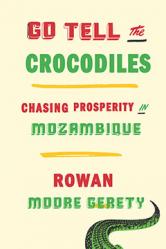AUTHOR SPOTLIGHT: Rowan Moore Gerety
The New Press is excited to introduce Miami-based Rowan Moore Gerety, author of Go Tell the Crocodiles: Chasing Prosperity in Mozambique. Moore Gerety is a journalist whose work has appeared in The Atlantic, Foreign Policy, the Miami Herald, Slate, and the Virginia Quarterly Review. He has also produced radio stories for NPR and PRI. Moore Gerety is a Columbia University graduate and was a Fulbright fellow in Mozambique. New Press executive editor Marc Favreau sat down with Moore Gerety to learn more about his time in Mozambique and his thoughts on its current political climate.
“Overflows with fantastically close reporting, cool and subtle judgments, and characters that absolutely leap to life. Rowan Moore Gerety gets next to all sorts of Mozambicans—street vendors, poor farmers, a people smuggler, the hapless leader of the political opposition—and then takes us deep into lives that illuminate the dark, pitiless dynamics of profound underdevelopment.”
—William Finnegan, Pulitzer Prize–winning author of Barbarian Days
and staff writer for the New Yorker
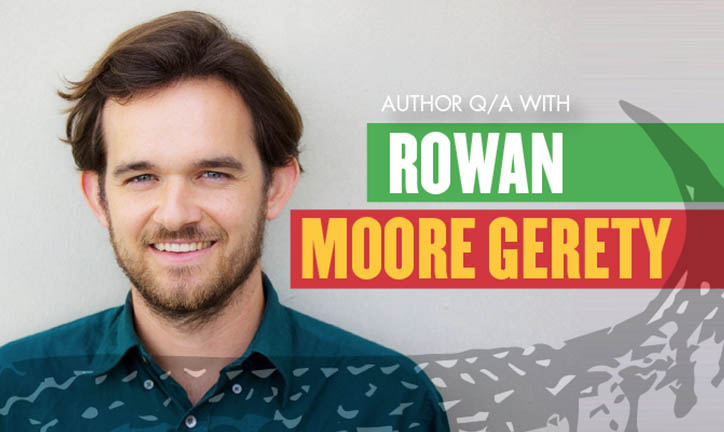
How did you first learn about Mozambique, and why were you particularly inspired to write about this place?
ROWAN MOORE GERETY (RMG): After college, I spent a year teaching English in Reunion Island, a former French colony off the coast of Madagascar. I had the chance to travel to Mozambique for a couple weeks afterwards, in 2008. I was captivated by the history of the country—to have such a recent experience of civil war and this shift from Marxism to what seemed to me like pretty raw capitalism—and by the language. I spoke French and some Spanish, but had never heard spoken Portuguese before and found it totally engrossing to try and read and improvise in, just hanging out in the market and trying to learn a few words (Mozambique actually has quite a number of African languages that are spoken by chunks of the population, but Portuguese is the lingua franca). At the time, I actually thought I wanted to research and write about cell phones, which were in the first stages of a massive boom there, offering people a way to bridge distance in a country where just a tiny fraction of people had access to landlines. But when I went back, my interviews always seemed more interesting when they veered off course and shaded into politics and history.
Your book includes a broad perspective on Mozambique, as well as a lot of nuanced, first-person accounts of real people from many different walks of life. Can you tell us about your research and reporting process?
RMG: In the case of the most personal chapters, which focus on two entrepreneurs—one still a child, selling muffins in the capital, and the other a businessman trying to get some stability in a rural town—I met the subjects through pure serendipity. One stopped me on the sidewalk; I got introduced to the other after a conversation around the corner from his business, and I just became interested in their lives. Journalism isn’t friendship, and shouldn’t be confused for it, but there’s a bit of a mix here in the sense that my initial contact with both Preta Dany and Bento started with a spark of friendship. Other chapters came about in a much more conventional way—I think I learned about the phenomenon of violence in response to cholera outbreaks in the newspaper, and as I read whatever I could find, I decided to visit the place where that history had been deadliest. Afonso Dhlakama, who lost the Mozambican civil war and became the leader of the political opposition, is just a fascinating, somewhat frightening figure to have in politics. As I got to know the country a little better, I started to feel that he was really central to understanding recent history in Mozambique, and so I started making calls to see if I could get a meeting. In a lot of cases, it’s hard to overstate the privilege of access and immediate interest sparked by being a white foreigner in Mozambique, and I’d be lying if I didn’t think that helped me find my way to some of these stories—with almost anything connected to the government, it’s just remarkably easy to get passed up the ladder to very senior people. There’s one scene in the book in which I wind up interviewing the number-two police official in the most populous province of Mozambique—almost like the deputy attorney general of California or something like that here—just by knocking on the door impromptu. A lot of that is bound up with wealth and status and race in a very problematic way, and some of it is a more natural product of human interest in novelty.
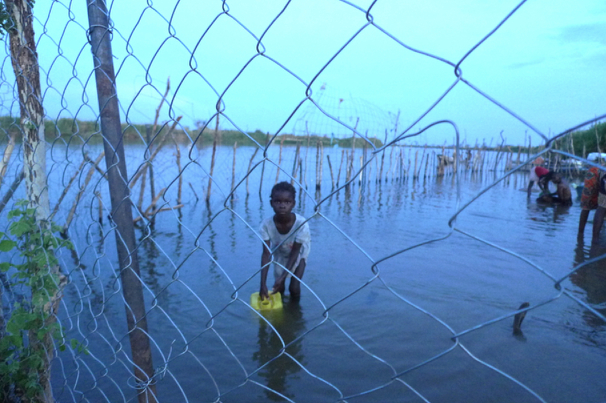
A child collects water inside a makeshift chainlink enclosure Bawa residents put up to protect themselves from crocodile attacks. During my visit in 2011, after a decade in which crocodiles had killed nearly fifty people in Bawa, the only borehole water pump was broken. (Photos by Rowan Moore Gerety)
Do you have a favorite character in the book?
RMG: I spoke with so many people I came to admire in the course of reporting this book. One who stands out is a man who asked me not to use his name, a municipal clerk in Beira who was caught in the middle of a dispute between the city government, led by an opposition mayor, and the national government. The man, who I call Mr. Vicente in the book, worked in one of the little neighborhood-level office buildings where people come to get the certificates of residency they need to open bank accounts, obtain birth certificates, and so forth. When an opposition party came to power in Beira, the national government began to argue that all those buildings actually belonged not to the government itself, but to the ruling party. The case got tied up in court and, as a result, while this power struggle dragged on for years over his head, Mr. Vicente had to do his job outdoors, working at a desk in the middle of an open-air market surrounded by traffic and people frying sweet potatoes and selling Coca-Cola. He’d been a civil servant for almost fifty years by the time I met him, and he was very old-school—stern, focused, by-the-book. He was indignant about his circumstances, but also completely resolute in carrying on with the task at hand. When it rained, he would set up shop in a little covered alleyway across the street. At night, he left his desk chair at a nearby shop for safekeeping. I found something so decent, and so noble, about his determination to keep providing these basic public services day after day no matter what it required.
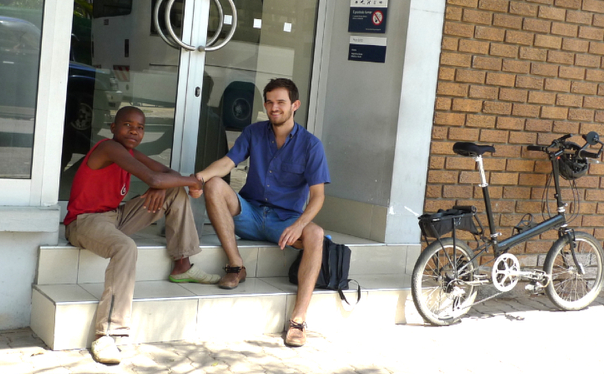
I met Bento because he wanted to buy my bicycle. This photo was taken shortly after his fourteenth birthday, when he’d already run away from home in the countryside and spent four years selling hardboiled eggs, fritters, and corn muffins on the sidewalks of Maputo, the Mozambican capital.
Of all the stories that have provided grist for a possible title, why would you settle on Go Tell the Crocodiles?
RMG: A bit of explanation: the title comes from a chapter that focuses on human-crocodile conflict along Mozambique’s largest river, the Zambezi. There are a handful of communities there where several people are killed and eaten by crocodiles each and every year—the chapter focuses on the worst example, Bawa, where fifty people died in the decade before I visited. The basic problem is that it’s dangerous for humans to be in very close quarters with large crocodiles for any reason. But people there depend on the river for everything—they gather water at the riverside, they farm along the riverbank because it doesn’t require irrigation, and overfishing by commercial operators means people have to go into crocodile nesting areas to get a decent catch. The government could do a lot to reduce the risk by doing a better job of enforcing fishing regulations, or by building some kind of running water supply to provide irrigation and water for laundry, dishwashing, and so on away from the river. Instead, the basic response has been to shoot a bunch of crocodiles up and down the Zambezi once a year.
Most everybody, including the people doing the hunting, agrees that it won’t do much to solve the underlying problem. But Florencio Sixpence, the government official who led the hunt, told me it made more sense to think of the cull as a “political” solution, not a technical one, because rural villages provide the lion’s share of votes in presidential elections. The title comes from something he said: “[If we don’t cull], whoever comes to stand in the elections will go out to the villages and they’ll say, ‘Go tell the crocodiles to vote for you, go tell the elephants to vote for you.’”
To Sixpence, crocodile culls are proof they’re being heard and seen by the same government that can’t find a way to provide them basic services like safe access to water. To me, the phrase “Go tell the crocodiles,” and that story, encapsulated a lot of what I was trying to get at in the book. Namely, that when big organized systems like government or the market economy fail to address our most pressing problems, we will still look for some kind of answer, even when it means embracing solutions that can be counterproductive.
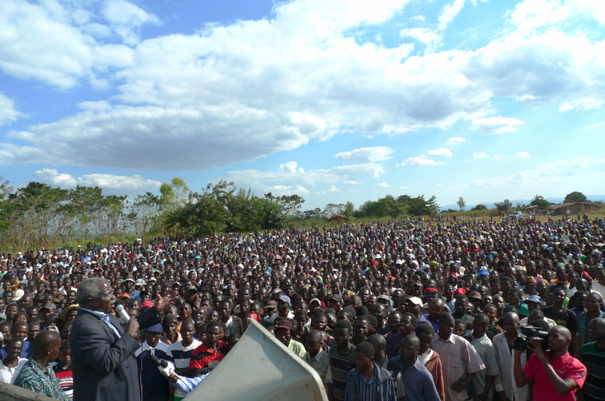
In Majaua, a tiny hamlet along the Malawian border in Zambezia, it seemed as though the entire district had come and waited for hours to hear Dhlakama speak. A banner on the road read,“Welcome His Excellency, the Source of Democracy.”
Your book captures a snapshot in time, in the recent history of Mozambique. What is happening now in that country, and what can it tell us about the world, or that part of the world, more generally?
RMG: Mozambique is living through a very precarious period. A lot of the things that seemed to be going right in the decades after the civil war—huge economic growth, multiparty elections, a lasting peace—have taken big steps backward. The government is still trying to work out how to keep the peace with its old adversary, Renamo, after a shadow war broke out in 2013–2015, and there has been a huge corruption scandal sparked by the fact that a small group of politicians borrowed $2 billion from foreign banks without telling anyone. That revelation gave Western governments that had supported Mozambique cold feet, and so the economy has taken a real hit. Inflation has been very bad, so it’s much more expensive for people to buy groceries and so on, and the government has had to slow down important investments like trying to hire more teachers.
The main lesson I’ve taken from writing about Mozambique is that it’s incredibly difficult to build up the machinery and institutions you need to make a government function in the best interests of its citizens. Many ordinary people could have told you there was a real problem with Mozambique’s trajectory a long time ago. When I first started interviewing people in 2011, people were already deeply frustrated about rising corruption, about a political system that favored the party in power, and about the fact that big mining and agribusiness projects were more of a priority than helping small farmers. But it seems as though the international players who might have steered the government to a different course were content to let these things slide as long as economic growth continued alongside passable elections. Now, all these different issues have gotten to a crisis point, and people are beginning to realize that good governance is really the linchpin of national prosperity. What’s tragic about Mozambique’s case is that this is a lesson history has taught us again and again, both across Africa and in weak states around the world.

